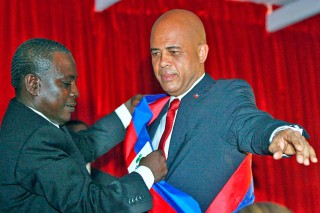|

It has now been five months since the conclusion
of Haiti’s two-round presidential and legislative national
elections. The presidential winner, Michel Martelly, has failed
to form a government that might begin to tackle the enormous
challenges facing the country. This failure is mainly because
Martelly has insisted on nominating only his right-wing cronies
for the post of Prime Minister.
The legislature (whose approval
is required) has recently rejected Martelly’s second nomination,
that of former de facto Justice Minister Bernard Gousse.
The Parliament has clearly indicated that it will not accept
such unilateral nominations. Indeed, the Constitution instructs
the President to choose a candidate “in consultation”
with the heads of Haiti’s two legislative houses. But President
Martelly refuses to do this, vainly trying to stir up popular
outrage at “stubborn and unreasonable” legislators in
order to get his way. Instead of a reconstruction plan, Haiti
gets a debilitating and destructive political dispute.
Martelly’s provocative conduct
outstrips his feeble mandate. The election that hoisted him to
power was marred by many obstacles to voter participation,
including the massive disruption caused by the earthquake,
inadequate and fraudulent voter registration, and an
insufficient number of voting stations (a fraction of what
existed in previous elections). Haiti's largest political party
– the Fanmi Lavalas of former president Jean Bertrand Aristide –
along with smaller parties were banned from running. In the end,
less than 25% of the electorate participated.
Haitian and international
political-rights organizations (including 45 members of the U.S.
Congress) said from the get-go that a fair election could not be
held under these circumstances. But the foreign powers that have
dominated Haiti since Aristide’s overthrow in 2004 were
determined to get a pliant and reliable president into office.
They paid for the election and dismissed all criticism of its
shortcomings, as recent WikiLeaked U.S. Embassy cables published
by Haïti Liberté have shown.
Critics were proven correct
during the vote’s chaotic first round on Nov. 28, 2010, which
was called a "fraud" or "fiasco" by almost every
independent observer on the ground. Capitalizing on the
confusion, Washington meddled via its Organization of American
States (OAS) to name the run-off candidates, who advanced to a
second round on Mar. 20, 2011. As planned, the winner, Martelly,
is a trustworthy representative of Haiti's economic elite and
its foreign allies.
Foreign powers have conspired
for decades to enfeeble Haiti's government and national
institutions, a history that Dr. Paul Farmer explains forcefully
in his just-published book, Haiti After the Earthquake.
Martelly’s election is just another chapter in this long story.
On Jun. 28, 2011, the
International Crisis Group (ICG) released a report on the
post-earthquake humanitarian crisis. It said:
“Although efforts to develop
a shelter and resettlement policy began in May 2010, it is still
being debated because there is no government interlocutor at a
technical or policy level who can sign off on an option. …
“The housing office (Entreprise
publique de promotion des logements sociaux) still is without a
comprehensive policy and effective authority to consolidate
peace and order by improving urban housing. Nor does it have
ministerial status or the capacity to bring together the core
resources to respond to more than one million displaced. …
“Beyond a planned but not
yet built industrial park [to the east of] Cap Haïtien, there
are few signs that Haiti is building back better since donors
pledged to contribute more than $5.7 billion over 18 months and
$10 billion over 10 years to finance recovery.
“Eighteen months after the
earthquake, the future remains uncertain for most citizens – in
part because they have not been sufficiently included in the
decision-making processes. Forced evictions from camps have
caused further disruption in the lives of the displaced.
Canadian media has reported
next to nothing about Haiti’s reconstruction plan, or lack
thereof. While the ICG report, among others in recent months,
looked at governance, shelter, health care (including the
growing cholera epidemic), and other dimensions of Haiti's
crisis in considerable detail, these issues have gone largely
unreported in Canada. (The latest in-depth analysis on this
topic in mainstream media appears in the Aug. 4 edition of
Rolling Stone.)
Canadian government “assistance”
to Haiti (as distinct from charity and NGO efforts) is focused
exclusively on police training and equipping prisons and is rarely
examined.
Few of Canada's
parliamentarians have shown any serious, ongoing interest in
critically examining Haiti, or in proposing new ideas and
alternative approaches. Parliament’s Standing Committee on
Foreign Affairs and International Development rarely discusses
Haiti, and, when it does, it draws from limited and selective
information sources.
A Canadian fact-finding
delegation that I recently led to Haiti has issued a 17-page
report on our findings. We observed a country in political and
social crisis. Little measurable progress is being made towards
meaningful and lasting development. We will circulate this
report to members of Canada’s Parliament, print and broadcast
media, and the many social and political organizations that have
shown interest and concern for Haiti. We hope this may encourage
more discussion regarding Haiti's fate, including what has
worked and what must change in Canada's role in providing
assistance.
An earlier version of this article was
published in the Canadian online journal The Mark. Roger
Annis lives in Vancouver, British Columbia and is co-ordinator
of the Canada Haiti Action Network (CHAN). In late June, he
led a three-person, 10-day fact-finding
mission to Haiti. You can read the delegation’s report on the
CHAN website:
www.canadahaitiaction.ca.
Go to the “Human Rights Reports” page of the website. |